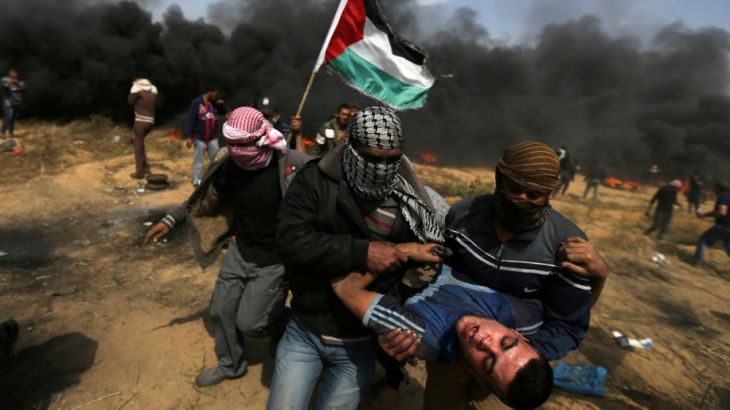Israeli forces kill four Palestinians, wound 955 at Gaza protest
Four Palestinian protesters killed and more than 950 wounded as Israeli forces again open fire at Gaza border.

Israeli soldiers shot dead three Palestinian demonstrators and wounded more than 950 at the Gaza border, despite the UN human rights chief urging Israel to stop using excessive force against Palestinian protesters.
A fourth victim, a 15-year old boy named Azzam Hillal, died of his wounds on Saturday. He was shot in the head by Israeli military during Friday’s protest.
Keep reading
list of 4 itemsThe world cannot turn its back on Sudan and its neighbours any longer
Russia-Ukraine war: List of key events, day 784
Iraq’s dangerous balancing act between Iran and the US
Among the wounded, 178 were shot with live ammunition on Friday while others sustained injuries from rubber-coated steel rounds, or required treatment for tear gas exposure.
Thousands gathered in the besieged Gaza Strip for the fifth-straight Friday as part of a mass sit-in known as the Great March of Return movement. Palestinians have been demanding the right to return to their homes seized by Israel in 1948.
|
|
The protests raised the total death toll to at least 45 Palestinian demonstrators, with more than 6,000 wounded since the mass movement began on March 30. There have been no Israeli casualties.
Al Jazeera’s Stefanie Dekker, reporting from the scene in Gaza, said thousands of demonstrators were seen “running towards the border fence with Israel, the closest that they have ever been in the past five weeks of protests”.
“We heard an opening of live fire [by Israeli forces] trying to push people back from that border,” Dekker said.
“Israel has made it very clear that they want people to stay away from … what they call a buffer zone. They say people will be shot.”
Eighteen medical personnel and journalists were among the wounded.
Ashraf al-Qidra, spokesperson for Gaza’s health ministry, said Israeli forces also targeted medical service points twice with quantities of unidentified gas east of the Al-Bureij refugee camp in central Gaza.
A number of victims experienced convulsions, severe vomiting and suffocation as a result of their exposure, he said.
![Tear gas canisters are fired by Israeli troops at Palestinian demonstrators during a protest demanding their right to return to their homeland [Ibraheem Abu Mustafa/ Reuters]](/wp-content/uploads/2018/04/4356108a62fc415da2ffe946ace9ce22_18.jpeg)
‘People have lost their fear’
Known as the world’s “largest open-air prison”, an Israeli-Egyptian blockade has been suffocating the Gaza Strip for the past decade and residents say they have reached a breaking point.
Living conditions have severely deteriorated over the years. Youth unemployment is at 60 percent and residents typically only receive four hours of electricity a day.
Many medical patients die a slow death because Gaza does not have basic medical resources, and they are unable to leave Gaza for treatment elsewhere because of the blockade.
|
|
The situation has become so desperate that “people have lost their fear” and will continue to protest at the border despite the danger of facing live fire by Israeli forces, Dekker explained, noting when demonstrators came under a barrage of fire at the border fence, they did not run back.
“Yes, they go to the border fence; yes, they throw stones; yes, they throw Molotov cocktails, but you’re dealing with one of the best-equipped armies in the world,” she said.
“This is their way of resisting what they call the occupation, resisting the blockade that gives them no freedom of movement.
“Their situation is so miserable in Gaza. I’ve been reporting from the Gaza Strip for years and it’s never been this bad.”
Israeli officials have accused Gaza’s rulers Hamas of instigating the protests, but not a single rocket has been fired from the Gaza Strip since the demonstrations began.
![Palestinian protesters run from tear gas launched by Israeli forces [Mustafa Hassona/Anadolu Agency]](/wp-content/uploads/2018/04/9dabb962cf174148bee2044eba34e80d_18.jpeg)
Call for arms embargo
Amnesty International on Friday called for governments worldwide to impose an arms embargo on Israel following the country’s “disproportionate response” to the demonstrations along the border fence.
“The nature of these injuries shows that Israeli soldiers are using high-velocity military weapons designed to cause maximum harm to Palestinian protesters that do not pose imminent threat to them,” an Amnesty report noted.
“These apparently deliberate attempts to kill and main are deeply disturbing, not to mention completely illegal. Some of these cases appear to amount to wilful killing, a grave breach of the Geneva Conventions and a war crime.”
Earlier on Friday, UN High Commissioner for Human Rights Zeid Ra’ad al-Hussein condemned Israel’s use of “excessive force” against Palestinian protesters, saying its security forces must be held to account.
“The loss of life is deplorable and the staggering number of injuries caused by live ammunition only confirms the sense that excessive force has been used against demonstrators – not once, not twice, but repeatedly,” Zeid said.
Palestinians have long demanded that as many as five million direct descendants of the original Palestinian refugees be given the right of return to their ancestral homes.
Israel has ruled out the demand, arguing the Palestinians returning to what is now Israel would outnumber its Jewish majority.
The Great March of Return movement is officially scheduled to continue until May 15, known as Nakba Day, marking the expulsion of hundreds of thousands of Palestinians during the creation of Israel.
However, with no alternatives, many participants believe the movement will continue beyond that date.